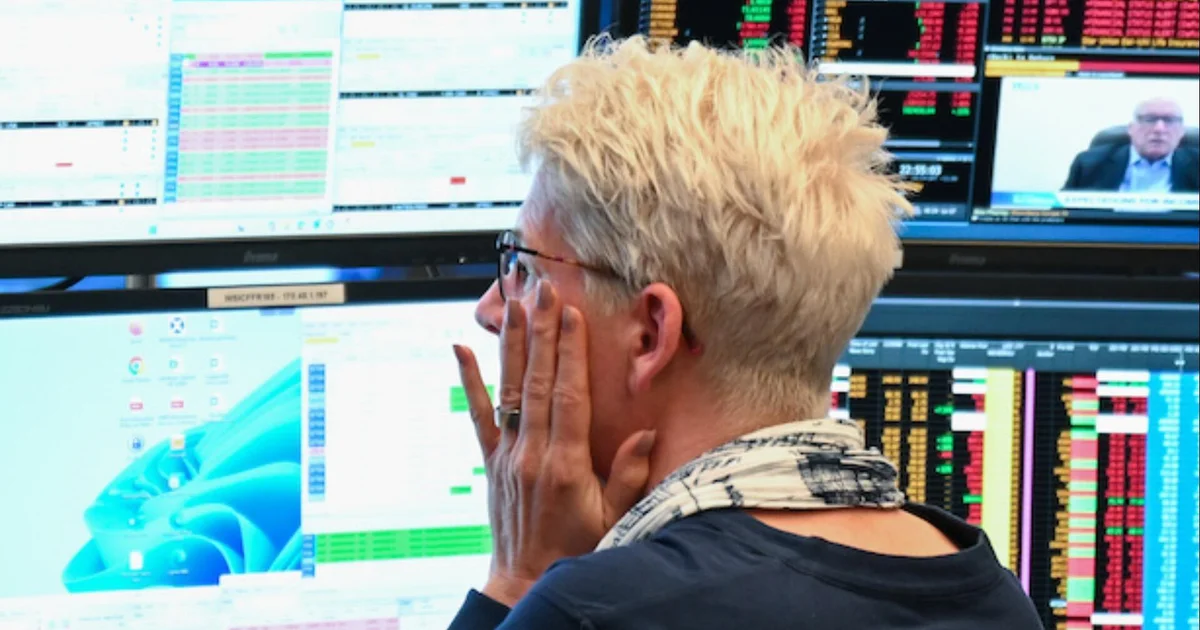The stock market slumped again on Wednesday as investors braced for more turmoil amid President Trump’s growing trade war, which threatens to raise prices for U.S. consumers and blunt economic growth.
The Dow Jones Industrial Average tumbled 320 points, or 0.8%, to 37,645 in early trading, while the broad-based S&P 500 slipped 0.1%. The tech-heavy Nasdaq composite index rose 0.3%.
The S&P 500 is now down about 19% from its mid-February peak, pushing the stocks to the edge of a bear market, or when shares fall more than 20% from their most recent high, according to financial data firm FactSet.
On Wednesday, China said it is raising its tariffs on U.S. products to 84%, up from its previously announced 34%, after President Trump’s import duties on Chinese good went into effect today at a rate of 104%. The retaliation signals Beijing isn’t backing down from Mr. Trump’s global trade war, which Wall Street economists warn could raise the risk of a global recession and hurt U.S. corporations and consumers by hiking prices on products from almost every nation.
The “Trump tariff armageddon is here,” said Wedbush analyst Dan Ives in an April 9 research note. “In our view, these tariffs have already created significant enterprise demand destruction out of the gates as [capital expenditures] and new projects are being halted across the U.S. until this chaotic situation is better understood by CEOs and business leaders around the world.”
Mr. Trump’s broad-based tariffs, which apply to imports of almost every nation, kicked in after midnight Eastern time in the U.S.
Already, there are signs that some corporations are feeling the impact of Mr. Trump’s tariff policies, with Delta on Wednesday pulling its guidance for 2025 as the trade war depresses bookings across the travel sector.
“With broad economic uncertainty around global trade, growth has largely stalled,” CEO Ed Bastian said in a statement on Wednesday. “In this slower-growth environment, we are protecting margins and cash flow by focusing on what we can control.”
Recession risks
With Mr. Trump’s trade war increasing the risks of a recession, investors should brace themselves for additional near-term stock declines, said Solita Marcelli, chief investment officer Americas at UBS Global Wealth Management, in an email.
“We do not believe the S&P 500 is currently priced for much beyond a mild recession (a drop to 3,500-4,500 would be more consistent with historical recessions, in our view),” Marcelli said.
With corporate earnings season starting in the U.S., investors will be carefully watching the guidance from large companies such as Delta. On Wednesday, Walmart said it is standing behind its full-year sales and operating income outlook even amidst the growing trade war.
The nation’s largest retailer said that it expects first-quarter sales growth of 3% to 4%, but added that its range of outcomes has “widened due to less favorable category mix” and “the desire to maintain flexibility to invest in price as tariffs are implemented.”
The Associated Press contributed to this report.
Aimee PicchiAimee Picchi is the associate managing editor for CBS MoneyWatch, where she covers business and personal finance. She previously worked at Bloomberg News and has written for national news outlets including USA Today and Consumer Reports.



